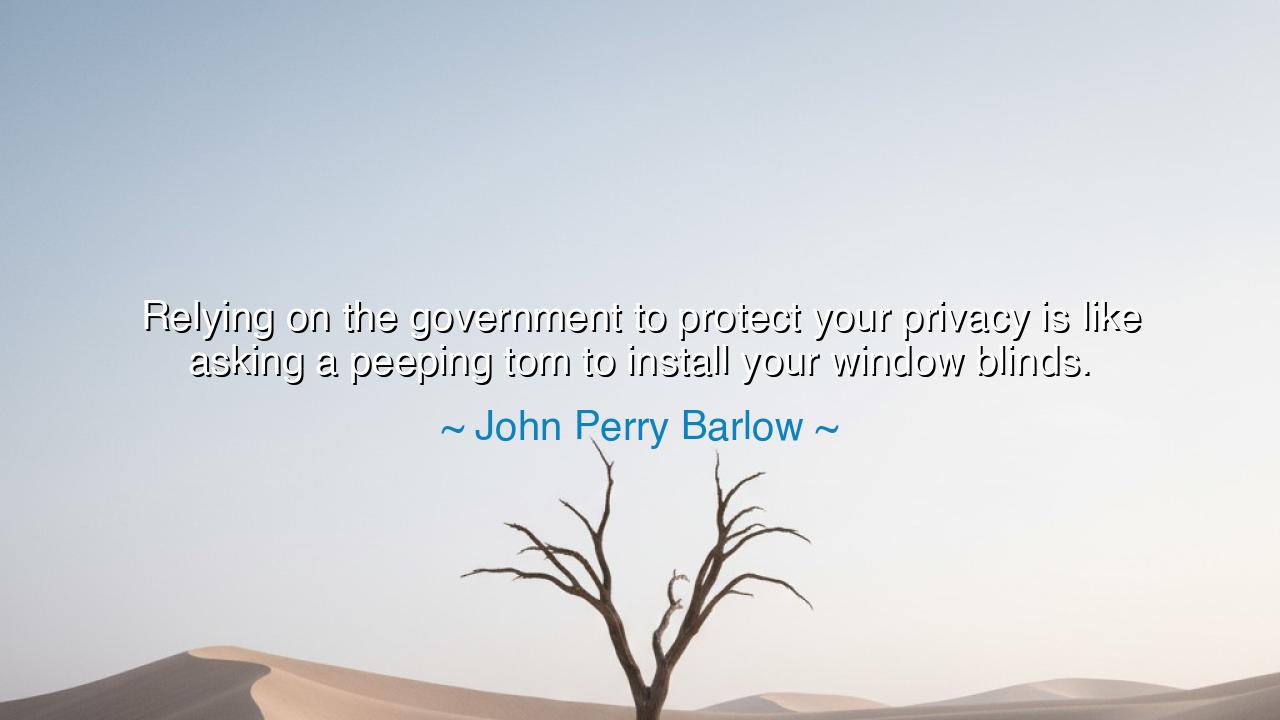
Relying on the government to protect your privacy is like asking
Relying on the government to protect your privacy is like asking a peeping tom to install your window blinds.






The words of John Perry Barlow — “Relying on the government to protect your privacy is like asking a peeping tom to install your window blinds.” — cut through the illusions of modern comfort like a blade of reason. They awaken us to a paradox at the heart of our age: that those who possess the power to watch us cannot be trusted to guard our secrecy. In this vivid and unsettling metaphor, Barlow, the poet-philosopher of the digital frontier, warns humanity of a danger older than technology itself — the danger of surrendering one’s freedom and privacy to those whose nature is to control. It is a truth as ancient as empires and as urgent as the internet: that the eyes of power, once opened, rarely close again.
Barlow spoke these words in the late twentieth century, when the world was just beginning to awaken to the vast new realm of the Internet — that infinite sea of connection and communication. As one of the founders of the Electronic Frontier Foundation, he stood among the earliest defenders of liberty in the digital age. He foresaw that governments, tempted by fear and ambition, would seek to stretch their reach into the private lives of citizens through the invisible threads of technology. His warning was not only for his time, but for all time: that privacy cannot be defended by the same hand that invades it. A government, he said, is not a guardian of secrets but a seeker of them; it is built to observe, regulate, and record — not to forget.
The imagery of a peeping tom is both startling and wise. It reminds us that curiosity becomes corruption when it violates the sacred boundary of the individual. Imagine a man who spies through another’s window, claiming to do so for safety, for protection, for the greater good — and then offering to install the blinds. Such hypocrisy, Barlow says, is the very logic of surveillance. The one who watches cannot also be the one who shields. True privacy is not granted by authority; it is secured by autonomy — by the individual’s control over their own walls, their own data, their own mind.
This truth has echoed through history in many forms. In the days of ancient Rome, when the Republic gave way to Empire, citizens grew accustomed to spies in their forums and censors in their letters. They were told that the surveillance was for the security of Rome, for the stability of order — and so they accepted it. But the cost was freedom of thought, the silence of dissent, and the slow death of civic courage. The same pattern emerged in every age that forgot the sanctity of the private self: the Inquisition of Spain, the secret police of kings, the totalitarian regimes of the twentieth century — all claiming protection, all demanding surrender. The lesson of Barlow’s words is the same lesson that burned in the ruins of every lost republic: when a people choose safety over privacy, they soon lose both.
In the modern world, his warning has become prophecy. The invisible towers of data that surround us — cameras, networks, algorithms, and satellites — form a web of observation more powerful than any empire of the past. Governments promise that this surveillance is for our safety, to guard against enemies and chaos. But as Barlow foretold, the digital peeping tom grows ever more curious, peering not only into our homes but into our thoughts, desires, and habits. What began as protection becomes control. What began as security becomes servitude. The boundaries of the self — once guarded by stone and silence — now exist only in the code of machines.
Yet Barlow’s words are not words of despair, but of awakening. He calls not for rebellion, but for responsibility. He reminds us that in the digital age, each person must be the keeper of their own privacy, the craftsman of their own walls. To trust blindly in institutions is to abandon the duty of vigilance. Freedom, he teaches, is not something bestowed by rulers but something defended by citizens — through awareness, through encryption, through education, and above all through courage. The wise man locks his doors not because he distrusts the world, but because he honors his own dignity. So too must the modern man safeguard his digital soul.
Let this be the teaching carried forth: privacy is the last sanctuary of the free mind. Protect it as you would your home, your faith, your very breath. Question those who demand your data in the name of safety, for safety bought with submission is an illusion. Be your own watchman; learn, build, and defend. The tools of freedom are in your hands — your knowledge, your discernment, your will to resist intrusion.
And thus, O listener, remember the timeless wisdom of Barlow’s words: those who peer into your life cannot also protect it. Do not invite the watcher to draw your curtains. Trust instead in your own power to build the walls of liberty — walls not of fear, but of understanding. For the day a people forget the value of their privacy is the day they cease to be truly free.






AAdministratorAdministrator
Welcome, honored guests. Please leave a comment, we will respond soon